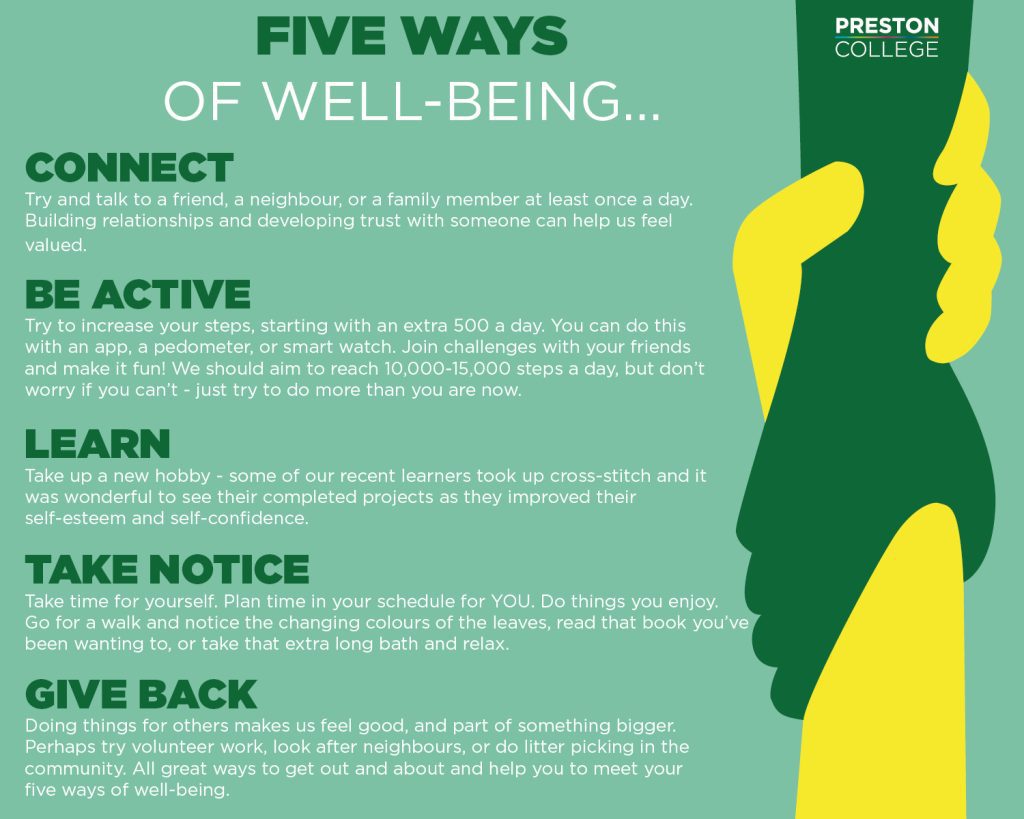Preston College Invests In Mental Health
Every Year on the 10th October, the World Health Organisation (WHO) recognises World Mental Health Day. This year’s theme is ‘Mental Health in an unequal world’.
The challenges faced in 2020 highlighted significant global inequality related to race and ethnicity, sexual orientation and gender identity and the lack of respect for human rights in many countries, including for people living with mental health conditions.
The COVID-19 pandemic further highlighted the effects of inequality on health, and no nation, however rich in stature, was fully prepared for this. The pandemic has and will continue to affect people of all ages from the physical distancing that has lead to social isolation, economic uncertainty and fear of job security and of course, the fear of infection and illness.
Around one in four people will experience a mental health problem each year, and yet this is still much harder to talk about than physical health.
Preston College, together with its dedicated Health and Wellbeing Team, are committed to heavily investing in mental health awareness and support; breaking down the stigma and giving learners and staff a safe and confidential platform to talk. We are currently appointing a team of qualified Mental Health First Aiders who are available on campus to both learners and staff.
It is widely reported that as many as 300,000 employees with a mental health problem lose their job every year, costing the economy £34.9bn according to the Centre for Mental Health (2021). For businesses, that means missing out on a vast pool of experienced and talented individuals, with proven capability relating to their role. Therefore, training managers and line managers could make a substantial company-wide difference in investing in staff mental health.
Recently, Preston College ran a development programme for over 60 staff to join a 12 week Mental Health First Aid and Mental Health Advocacy in the Workplace course. The feedback has been extremely positive, with some staff feeling more confident to share their own mental health experiences, helping to break down the stigma and stereotypes. Mental health can affect anyone and everyone at some point in their life.
Dee Gourlay, Lecturer in Mental Health Awareness says: “Every business in the UK can be effected by mental health problems in the workplace. Whilst there is now a growing appreciation for employers to address this, a lot still needs to be done to raise mental health awareness in the workplace and reduce the sigma it can have.”
“This course was a positive step towards breaking the stigma around mental health in the workplace, as well as teaching college staff about their responsibility for looking after the well-being of their colleagues and learners by implementing Wellness Action Plans.”
She adds: “In these present times with Covid and especially with the changing weather and seasons, it is important that we recognise that we have to look after ourselves. Two of the most important things we can do for our mental well-being are ensuring we are drinking enough water to stay hydrated, especially if we have the heating on, and 2 litres a day is a good start, and of course getting good quality sleep. Understanding the ‘five ways of well-being’ and taking extra Vitamin D to fight off the winter blues, will also support improved mental health and well-being.”

More information and support can be found at:
SANEline on 0300 304 7000
Samartians on jo@samaritans.org 116 123
Papyrus HOPLINEUK on 0800 068 4141 or email pat@papyrus-uk.org or text 07786 209697
MIND Infoline on 0300 123 3393 or email info@mind.org.uk
You can also download the Hub of Hope app, which will give you details of services local to you.
And, if you are considering learning about or would like to become a Mental Health First Aider, we offer the Level 2 Certificate in Mental First Aid.










